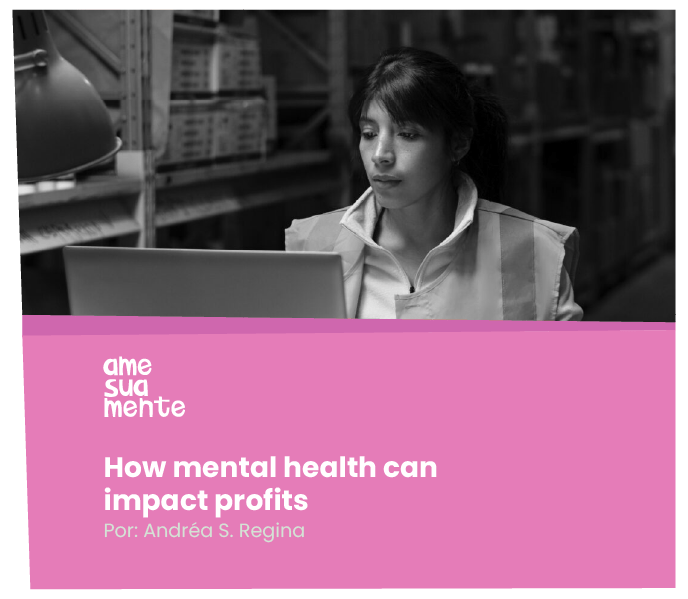
Nexo Jornal – 09.10.2023
Job security and psychological safety need to coexist. According to the World Health Organization, 1 in 4 people will be disabled by mental illness
Never in recent years has there been so much talk about sustainability, or rather, there has never been so much talk about the famous ESG (Environmental, Social, and Governance), which, to put it in a very simplistic way, guides the management of an organization in the light of indicators that govern an ethical, transparent operation committed to its social and socio-environmental responsibility. But why does the ìSî in ìsocial,î in the vast majority of cases, reflect a concern only with the social impact of the operation on the community (the private social investment carried out) or, at most, consider the internal perspective only with issues involving the promotion of DEI (Diversity, Equity, and Inclusion)? What about mental health? How many companies claim to be signatories of the Global Compact and, therefore, committed to the 17 Sustainable Development Goals, when SDG 3 – health and well-being – is practically ignored?
Mental health, celebrated this Tuesday (10), plays a fundamental role in achieving SDG 3 indicators, as it is intrinsically linked to general well-being. Mental health problems, such as depression and anxiety, can increase the risk of physical illnesses, such as cardiovascular problems, respiratory problems, and diabetes.
The company exists because there are people who make it up ñ and mentally healthy people guarantee the economic sustainability of organizations, based on the results they are able to deliver in their daily lives. Promoting mental health in the corporate environment directly contributes to improving people’s quality of life and, therefore, to greater productivity.
What we frequently see is companies paying attention to workplace safety and physical security, a major advance over the years, today guided by a regulatory framework that companies are obliged to follow. But what about psychological safety?
Job security and psychological safety need to coexist.
According to the World Health Organization, 1 in 4 people will be disabled by mental illness, which has an impact on the global economy of billions of dollars.
This is because inability to work, caused by mental illness, unlike other illnesses, occurs during the most productive phase of human life, between 30 and 50 years old. The impact of mental disorders on the economy is, therefore, greater than any other physical problem.
Today’s young people, who suffered from the social isolation caused by the pandemic more intensely than many, will be working in these organizations tomorrow. And are they prepared to offer a healthy environment, truly committed to psychological safety?
I was responsible for health promotion in a global company in the financial system for many years, and my biggest concern was working with leadership. ESG, to become the practice, needs to have everyone’s commitment, and this is also the case with a healthy organizational culture. Leadership plays a crucial role in cultural transformation. Leaders drive micro ecosystems within companies, which can promote a healthy culture or a toxic culture.
They can also be the biggest causes of stress in the workplace, which when too much, becomes a ìgatewayî to mental illness. Excessive stress can have an impact on the cardiovascular, respiratory, endocrine, musculoskeletal, and even gastrointestinal systems. That is, practically throughout our body.
It is known that short-term stressors, such as an immediate reaction or a reflex, are healthy, but long-term stressors, which last, become chronic and pathological.
However, it’s very common to see leaders who are constantly preoccupied with targets and results, often high-performance ones, but have little concern for people: they forget that the results they are aiming for can only be achieved through them.
PROMOTING MENTAL HEALTH IN THE CORPORATE ENVIRONMENT DIRECTLY CONTRIBUTES TO IMPROVING PEOPLE’S QUALITY OF LIFE AND, THEREFORE, TO GREATER PRODUCTIVITY
When demands are more than we can handle, we begin to feel stress. Human sustainability, or sustainable human development, stems from an integral vision of health, ìa healthy mind, a healthy body,î as the old saying goes. Thus, human sustainability = economic sustainability, which is = to greater productivity and profitability.
But why is it still so difficult to have humanized leadership and a healthy organizational culture? Are organizations blinded by high competitiveness in search of ever-increasing profits to satisfy shareholders?
Fact: there is no going back on the issue of mental health, the numbers speak for themselves. Before the pandemic, in 2019, the World Health Organization already had information that Brazil had the highest number of anxious people in the world and the 5th highest number of people suffering from depression.
This year, the PAHO (Pan American Health Organization) announced that ìin the first year of the covid-19 pandemic, the global prevalence of anxiety and depression increased by 25%. Concerns over possible increases in these conditions have already led 90% of the countries surveyed to include mental health and psychosocial support in their Covid-19 response plans, but large gaps and concerns remain.
The internal gaze of the “S” needs to look at the mental health of the company, or rather of its people, in pursuit of sustainable human development. Health promotion and attention to prevention must be part of the new era of sustainability, in which ESG needs to balance its axles. The relevance of the environmental aspect must be equal to the relevance of the social aspect, which in turn, must be equal to governance that reflects this new way of operating. This balance, therefore, becomes vital.
AndrÈa S. Regina is a specialist in ESG and DEI. A graduate in education, specializing in Administration, Marketing, Social Responsibility, and Health Promotion, she is the Executive Director of Instituto Ame sua Mente.








